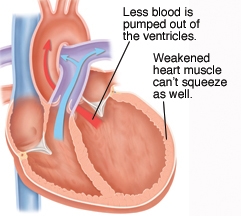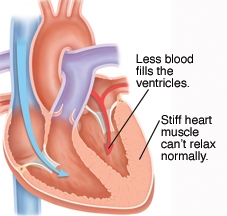Heart Failure
The heart is a muscle. It pumps oxygen-rich blood to all parts of the body. When you have heart failure, the heart can’t pump as well as it should. Blood and fluid may back up into the lungs, and some parts of the body don’t get enough oxygen-rich blood to work normally. These problems lead to the symptoms you feel.
When You Have Heart Failure
Because of heart failure, not enough blood leaves the heart with each beat. There are two types of heart failure. Both affect the ventricles’ ability to pump blood. You may have one or both types.
Systolic Heart Failure
The heart muscle becomes weak and enlarged. It can’t pump enough blood forward when the ventricles contract. Ejection fraction is lower than normal.
Diastolic Heart Failure
The heart muscle becomes stiff. It doesn’t relax normally between contractions, which keeps the ventricles from filling with blood. Ejection fraction is often in the normal range.


How Heart Failure Affects Your Body
When the heart doesn’t pump enough blood, hormones (body chemicals) are sent to increase the amount of work the heart does. Some hormones make the heart grow larger. Others tell the heart to pump faster. As a result, the heart may pump more blood at first, but it can’t keep up with the ongoing demands. So, the heart muscle becomes more damaged. Over time, even less blood is pumped through the heart. This leads to problems throughout the body.
What Is Ejection Fraction?
Ejection fraction (EF) measures how much blood the heart pumps out (ejects). This is measured to help diagnose heart failure. A healthy heart pumps at least half of the blood from the ventricles with each beat. This means a normal ejection fraction is around 50% or more.
